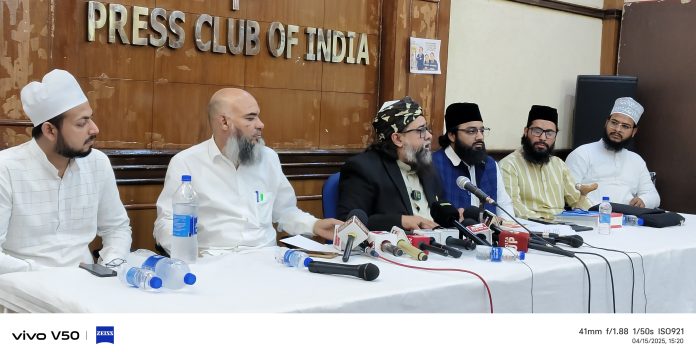– Abdul Bari Masoud
New Delhi: One of the prominent Sajjādah Nasheens (Sufis) and President of Majlis-e-Sharai Trust (Mumbai), Advocate Syed Sibtain Haider Zaidi, has joined the growing list of petitioners challenging the constitutional validity of the Waqf (Amendment) Act, 2025 in the Supreme Court of India. The Act, widely criticized as a “black law,” has drawn severe backlash from community organizations and opposition parties.
Addressing a press conference at the Press Club of India here, Syed Sibtain Haider Zaidi said the Muslim community has already raised serious concerns over the passage of the amended Waqf Act, which violates the fundamental rights of religious minorities. Advocate Zaidi, who is a Sajjādah Nasheen of Khanqah-e-Barkaatiya, said he represents the Naqshbandi order — a major Sunni Sufi order — and its followers are deeply concerned over the manner in which the Waqf Bill was passed without taking the views of the community into account.
The Majlis-e-Sharai Trust filed the PIL under Article 32 of the Constitution, raising serious concerns about the violation of the fundamental rights of religious minorities, especially Articles 14, 25, 26, 29, and 30. The Trust, a Mumbai-based religious public trust, is committed to preserving Islamic religious institutions and has approached the Court as a representative voice of over 3,000 waqf-based grassroots religious institutions across India. These include 1,200+ mosques, 330+ Islamic seminaries (madāris), 80+ Sufi khānqāhs, 55+ dargāhs (shrines), and 1,800+ waqf graveyards (qabrustāns). These institutions form the spiritual, educational, and social backbone of India’s Muslim communities, particularly in rural and semi-urban regions.
The petition challenges key provisions of the Waqf (Amendment) Act, 2025 on the following grounds:
1. Violation of Article 26(b) – The inclusion of non-Muslim members in Waqf Boards infringes upon the Muslim community’s right to manage its own religious institutions.
2. Curtailment of Minority Autonomy (Article 30) – Delegating waqf management powers to government officials (Collectors, District Magistrates) undermines community control.
3. Repeal of Section 107 – The application of the Limitation Act allows encroachers to legalize possession of waqf land after 12 years, weakening the perpetual nature of waqf.
4. Executive Overreach – The domination of Waqf Boards by nominated, unelected members violates the principle of community representation and Article 14.
5. Absence of Independent Judicial Oversight – The amendment eliminates meaningful checks and balances, leading to unchecked bureaucratic authority.
Petitioner’s Statement: “This PIL is not a personal pursuit, nor a political move. It is the lawful voice of thousands of religious institutions that fear being dispossessed silently under the veil of reform. Waqf is not just a matter of property — it is a sacred trust. If this amendment is allowed to stand, it will alter the future of Muslim institutions and weaken India’s constitutional pluralism.”
Zaidi said the petition seeks a declaration that key provisions of the Amendment Act are unconstitutional, restoration of Section 107 of the Waqf Act, 1995, protection of community-led waqf management systems, and the creation of judicial mechanisms for waqf protection.
He expressed hope that the court would give due attention to these petitions filed by various groups, as the new waqf legislation is in contravention of the Constitution of India. He also criticized the ruling party and its allies for spreading false propaganda about waqf institutions.
When asked about some Sufis supporting the amended waqf law, Zaidi responded, “They are phony (Naqli) Sufis. We are the genuine ones. That’s why we have challenged this act, which amounts to direct interference in our religious matters.” He further clarified that there are no differences between his group and other community organizations regarding the waqf issue, stating that it is a collective cause for the entire Muslim community.
All eyes are now on the Supreme Court, which has scheduled the hearing for today.




